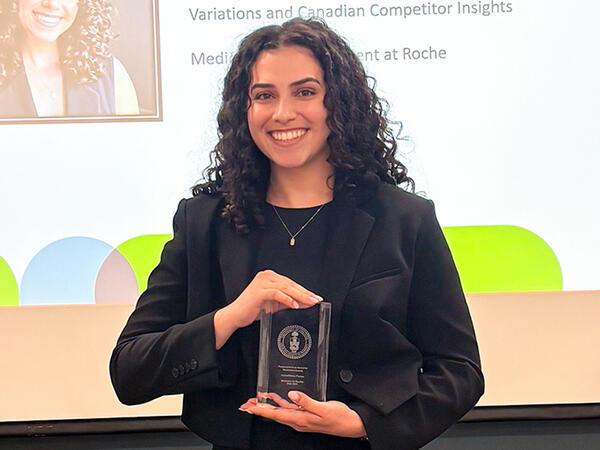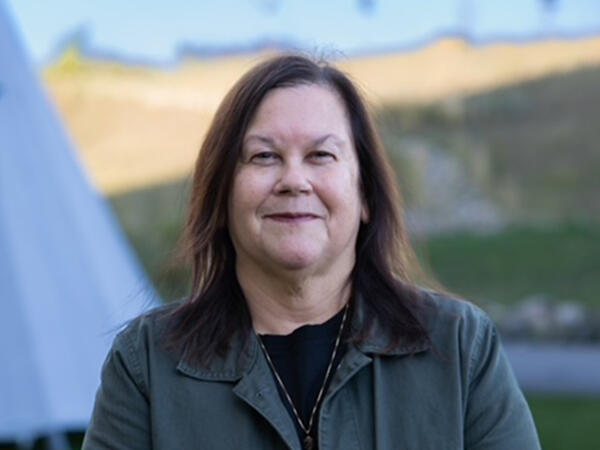What is your academic background and why is this area of research important?
I obtained my HBSc in pharmacology from the University of Toronto in 2022. In the same year, I joined the Leslie Dan Faculty of Pharmacy as a MSc Pharmaceutical Sciences student under the supervision of Dr. K. Sandy Pang. My research focuses on the pharmacokinetics and metabolism of vitamin D metabolites in chronic kidney disease.
Chronic kidney disease is associated with reduced glomerular filtration rate which can alter the renal and nonrenal clearance of many drugs including vitamin D. Understanding the patient-specific and drug-specific parameters governing the kinetics of vitamin D in this special population is essential. By employing pharmacokinetic modeling, we aim to accurately describe these parameters and inform the optimal dosing of vitamin D in individuals with chronic kidney disease.
What led you to your current Supervisor’s lab/research group?
During my undergraduate studies, I had the opportunity to explore various aspects pharmacology. Particularly, I was fascinated by pharmacokinetics, which explores how the body interacts with drugs through absorption, distribution, metabolism, and excretion processes.
During my exploration of this subject, I discovered the research conducted by Dr. K. Sandy Pang in the field of pharmacokinetics. Her expertise in pharmacokinetic theory and physiologically based pharmacokinetic modeling aligned perfectly with my aspirations. Joining Dr. Pang’s research group provided me with the ideal platform to explore the intricacies of pharmacokinetics and contribute to cutting-edge research in this field.
What are some of the challenges you had to overcome within your research?
Conducting research in graduate studies requires unwavering optimism and perseverance. In the beginning of my research, I encountered a challenge in attempting to develop a LC-MS/MS method for the detection of a highly lipophilic compound in low concentrations. Due to limitations with machine sensitivity, I had to explore alternative approaches to improve sensitivity during the sample preparation stage. It was undeniably frustrating when a project I had dedicated months to did not unfold as expected. After months of literature searches, extensive trial and error, and invaluable guidance from my peers, research associates, and supervisor, I gradually optimized the LC-MS/MS method to successfully detect the elusive compound. This process enforced in me the importance of embracing unexpected challenges with an open and optimistic mindset.
How do you see your current research playing a role in your career?
In my current research, I have gained a profound understanding and appreciation of pharmacokinetics and its essential role in drug development. In this process, I have also developed a diverse skill set including LC-MS/MS machine operation, modelling and simulation techniques, as well as a meticulous and creative approach to problem-solving. Together, these attributes have helped me grow as a scientific researcher. I aspire to contribute to the field of drug metabolism and pharmacokinetics (DMPK) or clinical pharmacology in the pharmaceutical industry.
What do you like to do when you are not working on research?
I enjoy touring the city, casual cycling and watching the sunset. After finishing my work at the lab, I bike with friends to check out cafes and restaurants for a taste of new cuisine. We seem to always end up at Harbour Front near evening when the sunset looks most breathtaking across the lake. It is during these moments I feel most relaxed.
More News
Image

Research team aims to co-design diabetes and dementia support programs that meet community needs
Network for Health Populations funding will support collaborative project to improve health outcomes for immigrant communities in Mississauga.
Read More
Image

Pharmaceutical industry resident finds growth in new challenges
Pharmaceutical Industry Residency Program Award recipient AnnaMaria Passas gained new skills through residency and research project to improve marketability in industry.
Read More
Image

Pharmacy alum sees change in acceptance of Indigenous cultures in health care
During Deborah Emery’s 40-year pharmacy career, she provided care in Sioux Lookout, Thunder Bay and Manitoulin Island.
Read More
